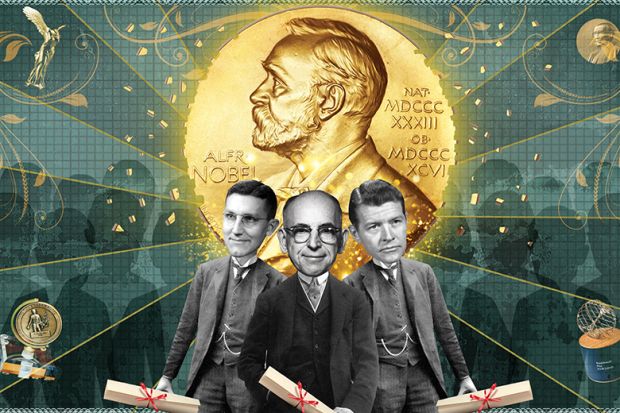Glitzy academic prizes have always provoked a certain ambivalence among researchers. This has only been intensified by the slew of new awards set up in recent years by wealthy donors, some of which are promoted with a razzmatazz that celebrates the donor as much as the awardees.
But I think that there is one reason to welcome this proliferation: it dilutes the primacy of the Nobel prizes.
These currently distort the public perception of which sciences are important and how science is actually done. Famously, mathematics has never been included, but the Nobels also exclude vibrant new fields such as computing, robotics and artificial intelligence, as well as environmental sciences: space, oceans, climate and ecology.
So it is good that there are recently-established prizes in all of these areas: in some cases with similar jackpots. Nor are the humanities being overlooked: consider, for instance, the million-dollar Berggruen Prize for philosophy, awarded this year to Onora O’Neill. Overall, major awards now offer a better balance across the “map of learning”.
Moreover, they apply a broader range of criteria, sometimes recognising an individual’s “lifetime achievement”, as opposed to a single discovery. Literature is the only Nobel category that explicitly rewards lifetime achievement. The results have admittedly been controversial, but science is a single, global culture, in which consensus on relative achievements is a more realistic aspiration.
Some great discoveries are made by individuals who would be generally acclaimed as exceptional intellects. Other Nobel-winning discoveries have sometimes been made (serendipitously) by people who wouldn’t claim any intellectual superiority to the average university professor. But in public perception all Nobelists are among our greatest minds.
Even if the Nobel Committee identifies a discovery that’s unambiguously prize-worthy, it’s often hard to apportion credit. There are many instances in which several people have separately researched the same topic (in parallel or in series). For instance, the Higgs boson was an idea that emerged in the 1960s: six people are generally agreed to have played key roles in predicting its existence. Of these, the one with the strongest and most sustained lifetime achievement, the late Tom Kibble, did not receive a share of the 2013 Nobel prize because the Nobel committees have chosen to impose a limit of three on the number of people who can share a single prize.
Science is a cumulative enterprise even in theoretical fields in which there is no need for formal collaboration. But it’s increasingly common, in experimental science, for a discovery to require a team effort. The actual discovery at Cern of the predicted Higgs boson involved a cast of thousands – and received no Nobel accolade.
This year’s Nobel in physics, awarded last week, recognised a discovery, the detection of gravitational waves, that was reported in a 1,000-author paper. Yet just three of these authors were rewarded. And in recent years Nobel prizes have recognised other team efforts in the same way. For instance, the 2015 physics award, for studies of neutrinos using large-scale underground equipment, was given to the heads of two groups. In contrast, the Breakthrough Prize (founded in 2012) for the same discoveries, awarded in 2016, explicitly recognised all members of five groups (and also, incidentally, gave a prize to the experimenters at Cern who discovered the Higgs).
In 2011, the Nobel physics prize went to astronomers for the remarkable discovery of the “dark energy” latent in empty space that causes the expansion of the universe to accelerate (astronomy is only within the Nobel remit if it leads to some fundamentally new physics). This research was accomplished by two independent teams, each with up to 20 members, and several people were overlooked who had made distinctive contributions and had track records fully as distinguished as those of the awardees. By contrast, the Breakthrough and Gruber prizes (the latter established in 2001) recognised all team members involved in the discovery.
In the case of gravitational waves, there would be a consensus that last week's three Nobel winners were outstanding individuals whose contributions were prolonged, distinctive and complementary. But I still think that the Breakthrough and Gruber prizes, which honoured the discovery of gravitational waves before the Nobel Committee did, took a fairer approach in highlighting the leaders but, once again, explicitly recognising the whole team (giving each member £2,000, in the case of the Breakthrough Prize). Their approach also gave a better impression of how this project actually achieved its amazing success.
Scientists should be grateful that the “Nobel laureate” label gives some of our colleagues a celebrity status that raises the scientific profession’s visibility generally. But the public should realise that even the best scientists have narrow expertise, and their opinions on general topics carry no special weight. It is possible to find a laureate to support almost any cause, however eccentric, and some exploit their status.
Overall, both science and the public are better served by prizes that offer a truer perspective on the scope of science, and the collective and interactive way in which it is actually done. If the Nobel committees are unwilling to amend their rules accordingly, we should welcome the gradual erosion of the special status of their prizes.
Martin Rees is astronomer royal at the Institute of Astronomy, University of Cambridge.
Register to continue
Why register?
- Registration is free and only takes a moment
- Once registered, you can read 3 articles a month
- Sign up for our newsletter
Subscribe
Or subscribe for unlimited access to:
- Unlimited access to news, views, insights & reviews
- Digital editions
- Digital access to THE’s university and college rankings analysis
Already registered or a current subscriber? Login







